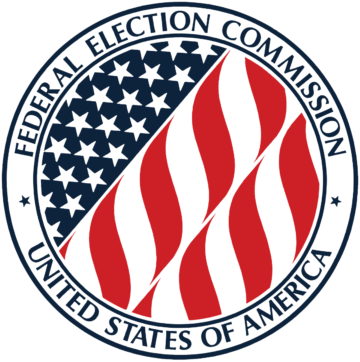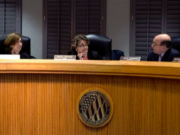VIA ELECTRONIC MAIL
Robert M. Knop
Assistant General Counsel
Federal Election Commission
1050 First Street NE
Washington, DC 20463
RE: Notice 2018-05, Rulemaking Petition Concerning Former Candidates’ Personal Use, REG 2018-01
Dear Mr. Knop:
The Institute for Free Speech (“the Institute”)[1] respectfully submits the following comments in response to Notice 2018-05.[2] That notice concerns potential “rulemaking to clarify the permissible use of campaign funds for former candidates and officeholders,”[3] as currently controlled by 52 U.S.C. § 30114 and 11 C.F.R. §§ 113.1 and 113.2.
The underlying petition asks the Commission to enact a regulation 1) clarifying the “permissible and impermissible uses of campaign funds for an individual who is no longer a candidate or officeholder,” and 2) establishing “a point at which a former candidate or officeholder’s continued spending of leftover campaign funds becomes . . . presumptively personal use.”[4] To support this course, the Petition points to reporting by the Tampa Bay Times purporting to demonstrate prohibited and potentially-prohibited uses of campaign funds by former officeholders.
The activity uncovered by the Times is concerning. It suggests that the Commission has failed to adequately enforce its existing rules prohibiting personal use of campaign funds. As the Petition states, under “[a] plain-language reading of the personal use statute . . . the permissible uses of leftover campaign funds become severely limited.”[5] In particular, the rules generally prohibit as personal use “any commitment, obligation, or expense . . . that would exist irrespective of the candidate’s election campaign or individual’s duties as a holder of federal office.”[6]
This is an intelligible, and enforceable, rule. But the regulations provide further clarity by listing activities that are prohibited as per se personal use: home mortgage and utility payments; clothing; dues, fees, or gratuities for country clubs, health clubs, recreational facilities, and other nonpolitical organizations; vacations and non-campaign trips; admission to concerts, games, and other events, unless associated with a campaign; and salary payments to family members in excess of market value.[7]
Thus, for example, former officeholders’ use of campaign funds to pay almost $31,000 in dues to nonpolitical membership organizations and clubs likely violated the statute and regulations.[8] Such expenditures include the more than $9,000 that former officeholders paid to the United States Association of Former Members of Congress;[9] the $3,800 paid to the Capitol Hill Club;[10] and the almost $1,200 paid to the Congressional Club.[11] These expenditures also include the more than $8,000 that former Representative Robin Tallon, Jr. identified as dues paid to the Country Club of South Carolina—while he was living there.[12]
Much of the other activity compiled by the Times also raises concerns. While not clear-cut, per se violations of Commission regulations, the available evidence suggests reason to believe violations have occurred. A Commission investigation is necessary to establish whether these expenditures were lawful or not, and—if so—whether they were made innocently or willfully.
For example, the statute and Commission regulations prohibit the use of campaign funds for sporting events, concerts, theater attendance, or other forms of entertainment, unless such expenses are associated with an election campaign.[13] The Times found that former officeholders spent $246,000 hosting or attending such events.[14] Some of those expenses are highly questionable, such as the $4,555 that Steven LaTourette spent on Ohio State football tickets.[15] And while Mark Foley’s tickets to a luncheon for the American Friends of British Art or a gala for the National Society of Arts and Letters might have been purchased for a good purpose, it seems unlikely that they were related to an election campaign 10 years after he was forced to leave office.[16] On the other hand, former officeholders may have a reason associated with a campaign to attend dinners for state and local political parties, or even to attend and campaign during football games. Nothing is gained by jumping to conclusions. Only by initiating a Matter Under Review (“MUR”) can the Commission determine these expenditures’ purpose.
Similarly, the Commission should be initiating MURs to investigate office expenses long after a designated campaign is over. The Times categorized $11,000 in charges for internet, $67,000 for phone and cell services, $69,000 for websites, $55,000 for rent, $20,000 for computers and tablets, $140,000 for computer software, and $70,000 for other office expenses.[17] It is possible that such expenses could be “in connection with a campaign,” even years after the fact, because these resources were necessary to monitor campaign accounts or store campaign materials.[18] But it seems more likely that at least some of these expenditures were for personal use.
The Times also classified $367,000 as payroll to family members.[19] While the regulations generally prohibit salary payments to family members, they do permit them to the extent family members perform bona fide services and the payments are not above fair market value.[20] The payroll noted by the Times could have been used for bona fide services, such as maintaining compliance and distributing funds to charities, etc. And the funds might have been paid at fair market value. Nevertheless, one might question why Ben Nighthorse Campbell and Jim Bunning paid their family members almost seven times what Elton Gallegly paid his—over $2,000 a month as opposed to $300.[21] Only the Commission, through a MUR, can verify whether these payroll expenses were legitimate.
And, while there are no fair market restrictions on salaries paid to non-family members, the Commission appears to have ignored payments for salary and consulting services made after former officeholders’ deaths, including those related to Thomas J. Manton, Mark Takai, Tom Lantos, James Exon, Craig Thomas, Paul Gillmor, Steven LaTourette, and Donald Payne. It is unclear how these expenses were in any way made to “defray[] expenses in connection with a campaign.”[22]
Finally, the Commission explicitly excludes meal and travel expenses from the per se rules, stating that whether such expenses “would exist irrespective of” a campaign or official duties must be determined on a “case-by-case basis.”[23] Such a case-by-case determination is important for expenses quintessentially related to the travel inherent in campaigning. Thus, while the more than $94,000 categorized by the Times as travel expenses would seem like personal use years after a former officeholder’s last campaign, that is still supposition.[24]
Again, these expenditures are concerning, and raise significant questions. They arise in an area of special legal significance. “Campaign funds are different from bribes because they are spent on the advocacy of the election of the candidate and/or the promotion of the candidate’s political positions.”[25] For this reason, they “implicate fundamental rights of free speech.”[26] But “if officeholders are free to spend contributions for personal enrichment,” the contributions underwriting these expenditures “begin to look more like personal gifts than an integral part of political speech, and opportunities are created for personal corruption.”[27]
Nevertheless, a rulemaking is premature.
In particular, the Petition suggests that the Commission “establish[] a time period beyond which campaign committee spending by a committee with no outstanding debts whose candidate is no longer in office or running for office is presumptively personal use.”[28] Such a rule, however, would add nothing substantive to the current regulations, since any committee could attempt to rebut the presumption. Moreover, as the Petition’s oblique reference to a committee “with no outstanding debts” suggests,[29] the concept of placing a specific time limit on the use of campaign funds appears to lack a legal basis. Congress specified the uses of campaign contributions, but none of the provisions of 52 U.S.C. § 30114 specify a time limit. Similarly, 52 U.S.C. § 30103 explains the means by which a committee may be terminated. But it also sets no timetable, and gives the Commission explicit discretion to make rules only in cases of insolvency.[30]
More broadly, the Times investigation took much of its information from the Commission’s own documents. This is not a situation where the Office of General Counsel must rely upon third-party reports, or handicap the likelihood that a particular press entity made a fundamental legal error in its reporting. The relevant information, and the ability to open a MUR or otherwise take action, has always been with the Commission.
Before undertaking a rulemaking, then, the Commission is obligated to determine the internal procedures necessary to investigate violations of existing rules, especially where the underlying basis for suspicion is already in the Commission’s hands. In that sense, the Petition is incorrect when it asserts that the situation uncovered by the Times “is not merely an issue of enforcement,” because—according to the Petition—the “breadth and scope of the dubious spending uncovered in the [Times] investigation . . . suggest that the Commission’s personal use regulations are not sufficiently clear with respect to former officeholders.”[31] Instead, it seems far more likely that the Commission’s lax approach to enforcement has encouraged noncompliance.[32]
And to the extent any of these expenditures reflect good-faith errors, they are unlikely to be remedied by adding additional pages to the Commission’s already lengthy regulations. As the Supreme Court noted in 2010: “The FEC has adopted 568 pages of regulations, 1,278 pages of explanations and justifications for those regulations, and 1,771 advisory opinions since 1975.”[33] The Commission has added to those rules and advisory opinions since 2010. As former officeholders shed the staff that helped them comply with this substantial body of law, the potential for errors only grows.
Thus, the available data demonstrates neither that former members of Congress are inherently corrupt nor that they are inherently confused. Rather, it points to the Commission’s consistent failure to detect violations of the personal use prohibition, even in easy cases.
Rather than add pages to its already complex and voluminous regulations, especially where doing so would not alter the substantive obligations of regulated parties, the Commission should prioritize the development of procedures that can catch the sorts of expenses the Times identifies—especially those most likely to be per se violations.[34] Furthermore, if the Times correctly suggests that the Commission has a policy of ignoring suspicious spending below a certain threshold, that policy should be reconsidered, and Congress should be asked to provide the resources required for proper enforcement in this area. In addition, the Commission should adopt a policy of alerting candidates to the personal-use prohibition at the conclusion of each election cycle and, in the case of sitting officeholders, upon retirement.
Finally, to the extent these steps are insufficient and additional guidance is necessary, the proper devices at this time are policy and/or interpretive statements issued pursuant to 5 U.S.C. § 553.
* * *
Thank you for considering these comments. The personal use of campaign funds raises real risks of corruption and the appearance of corruption, and the Commission should make greater efforts to enforce the existing proscriptions. Nevertheless, any further rulemaking, as opposed to policy and interpretive statements, should await active enforcement of the existing rules so that the Commission can properly perceive those rules’ deficiencies, if any. Accordingly, while there is room for the Commission to act, the Petition should be denied.
Respectfully submitted,
Allen Dickerson
Legal Director
Institute for Free Speech
https://www.ifs.org/wp-content/uploads/2018/05/2018-05-21_Dickerson-Comments_FEC_Former-Candidates-Personal-Use.pdf
[1] The Institute is a nonpartisan, nonprofit § 501(c)(3) organization that promotes and protects the First Amendment political rights of speech, press, assembly, and petition. Originally known as the Center for Competitive Politics, it was founded in 2005 by Bradley A. Smith, a former chairman of the Commission. In addition to scholarly and educational work, the Institute is actively involved in litigation against unconstitutional laws at both the state and federal levels.
[2] Should the Commission choose to hold a public meeting concerning this matter, the Institute requests the opportunity to provide testimony through a representative.
[3] Rulemaking Petition: Former Candidates’ Personal Use, 83 Fed. Reg. 12283 (Mar. 21, 2018) (to be codified at 11 C.F.R. pt. 113), as corrected by 83 Fed. Reg. 17509 (Apr. 20, 2018).
[4] Campaign Legal Center, Petition for Rulemaking to Revise and Amend Regulations Relating to Former Candidates’ Personal Use of Campaign Funds at 4, 6 (Feb. 5, 2018), http://sers.fec.gov/fosers/showpdf.htm?docid=373067 (“Petition”).
[5] Petition at 4.
[6] 52 U.S.C. § 30114(b)(2); accord 11 C.F.R. § 113.1(g).
[7] See 52 U.S.C. § 30114(b)(2); 11 C.F.R. § 113.1(g)(1)(i).
[8] See 52 U.S.C. § 30114(b)(2)(D) and 30114(b)(2)(I); 11 C.F.R. § 113.1(g)(1)(i)(G). To download and review the data the Times categorized as membership dues, see Eli Murray and Connie Humburg, Interactive Database: See how the 102 ‘Zombie’ politicians spent their money, Tampa Bay Times, Jan. 31, 2018, http://www.tampabay.com/projects/2018/investigations/zombie-campaigns/spending-millions-after-office/database/#/ (“Interactive Database”). This number includes dues to organizations like the Legislative Pilots Association, the Capitol Hill Club, the United States Association of Former Members of Congress, the Congressional Club, the Palm Beach Civic Association, an economic forum, and the Norton Museum of Art. This number does not include dues to organizations like the National Democratic Club, Mclean County Republican Women, or the Champaign County Republican Party. Although these are likely exempted political organizations, including dues to such groups would raise the total to almost $37,000.
[9] Id.
[10] Id.
[11] Id.
[12] See Christopher O’Donnell, Eli Murray, Connie Humburg, and Noah Pransky, Zombie Campaigns, Tampa Bay Times, Jan. 31, 2018, http://www.tampabay.com/projects/2018/investigations/zombie-campaigns/spending-millions-after-office/.
[13] See 52 U.S.C. § 30114(b)(2)(H); 11 C.F.R. § 113.1(g)(1)(i)(F).
[14] See O’Donnell, Zombie Campaigns.
[15] Id.
[16] See data from Murray, Interactive Database.
[17] See id. The Times in fact categorized $360,000 in software expenses. This figure includes, for example, consulting services paid to companies like Intelligent Software Systems, and other computer and database services paid to companies with “software” in their name. Counting only expenses that explicitly have the term “software,” or well-known software titles, in their description, former officeholders paid over $140,000 for computer software.
[18] See 11 C.F.R. § 113.2 (“in connection with a campaign”) and 113.2(e) (“May be used for any other lawful purpose . . . .”).
[19] See data from Murray, Interactive Database.
[20] 11 C.F.R. § 113.1(g)(1)(i)(H).
[21] See data from Murray, Interactive Database.
[22] 11 C.F.R. § 113.2; see O’Donnell, Zombie Campaigns (“Eight kept on spending even after the candidate they were supposedly working to elect had died — buying lavish dinners, paying cell phone bills and writing rent checks.”); Murray, Interactive Database (showing expenses by these former officeholders after their deaths).
[23] 11 C.F.R. § 113.1(g)(ii).
[24] See O’Donnell, Zombie Campaigns.
[25] Dissent of Comm’r Bradley Smith from Advisory Opinion 2001-09, at 1 (July 18, 2001) (Kerrey), https://www.fec.gov/files/legal/aos/2001-09/989492.pdf.
[26] Id.
[27] Id. at 2.
[28] Petition at 8.
[29] Id. Committees are required to remain open so long as they have debts, which strongly suggests that Congress anticipated accounts remaining open for some time after the conclusion of an election. 52 U.S.C. § 30103(d)(1) (“A political committee may terminate only when such a committee files a written statement… that such committee has no outstanding debts or obligations.”) (emphasis added).
[30] 52 U.S.C. § 30103(d).
[31] Petition at 4. The Petition also suggests, speculatively, that “former officeholders [may] use campaign funds for these expenses out of habit.” There is no basis for this assertion, and the foregoing explains that at least some of these expenditures would be unlawful even during an active campaign.
[32] Importantly, until the Commission makes enforcement in this area a priority, the scope of the problem—and trends that might provide the basis for a future rulemaking—is unclear. As of October 1, 2016, there were 611 retired Members of Congress receiving pensions. Katelin P. Isaacs, Retirement Benefits for Members of Congress 2 (Congressional Research Service, Dec. 5, 2017), https://www.senate.gov/CRSpubs/ac0d1dd5-7316-4390-87e6-353589586a89.pdf. And that number does not include members who served only one or two terms, or members who have not yet reached retirement age. See id. (noting minimum retirement age of 62 with 5 years of service or 50 with 20 years of service). Thus, the 102 individuals investigated by the Times represent only a fraction of the members of Congress who have retired or otherwise ceased seeking office.
[33] Citizens United v. Fed. Election Comm’n, 558 U.S. 310, 334 (2010) (citations omitted) (internal quotation marks omitted).
[34] Such efforts could include obtaining notices from Congress when former members begin to take pensions and when pensions end due to death. Moreover, analysts should be instructed to take a closer look when there is spending—other than transfers to charities and political parties, for example—years after a committee’s designated election, and the Commission should invest in automation capable of flagging such cases for staff review.














